4 Little Essex Street, London, WC2R
"It's a lovely pub isn't it?" The question was directed at me as I started to line up my camera. It was one of the two men who had been standing at the side of Milford Lane discussing the Cheshire Cheese pub and a point of maintenance. "Yes," I agreed, because it is a nice pub. The pair were, I learned in the subsequent conversational back and forth, investigating alternative ways of lighting the sign because the current lack of access is a pain whenever the bulb blows. "Good luck with the sign," I said cheerily as I took my picture and walked away. I didn't have the heart to tell the bloke I was actually more interested in the blandly modern office on the opposite side of Little Essex Street.
Piranha was a label spun off by venerable British publisher Macmillan. The company had previously released books about programming for the ZX81 and Spectrum through various labels, including Papermac and Kingfisher. Macmillan moved into software towards the end of 1983. Educational software, that is. The initial two ranges were released in association with Sinclair Research. The first, five titles for 5-7 year olds, a series called Learn to Read. The second, for 8-12 year olds, came out under the umbrella name of Science Horizons and included Cargo, Magnets, and Glider. Survival, the fourth title in the range, would be the most familiar to many Spectrum owners because it was part of the Spectrum Six Pack. A bundled collection of games designed to encourage people to buy the 48K Spectrum and show its potential.
Survival allowed you to roleplay as a hawk, lion, robin, mouse, fly or butterfly and aimed to bring "to life the hazards that different creatures must face in their struggle to stay alive." I suspect most people used to play it like I did, and see what happened when a butterfly tried to eat a lion; the results were technically educational but mostly hilarious. Sinclair & Macmillan would release another 13 titles early in 1985; four more Science Horizons titles, Oil Stike, Weathermaster, Planet Patrol, and Disease Dodgers; plus five more Learn to Read programs; and four counting programs, featuring a character called MacMan.
Macmillan released another batch of educational software for Christmas 1985 but the company was edging in a more commercial direction. Two games were based on Orm and Cheep, an ITV series for young children. CRASH's educational software correspondent Rosetta McLeod quoted a five year old who described the games as: "the worst programs he'd
seen," and a parent who said: "if he'd bought the
games for his children, he'd have returned them to the shop and tried
to get his money back." (
Issue 22 page 24). There was also
Magic, with an introduction by John Salisse of The Magic Circle, and
World Cup Soccer; two programmes in one,
World Cup Manager and
World Cup Fact-File. Then, in July 1986, Macmillan unexpectedly released a proper game; Don Priestley's
Popeye. The game was originally released by dk'tronics in Autumn 1985 but as the author later told CRASH (
issue 34 page 109): "Unfortunately, DK had
lost interest in software by this time and the bottom had fallen out
of the market. They were ready enough to offer it to Macmillan."
July 1986 was the same month Macmillan announced Piranha, it's new software label. 1986 was an odd year for a company to spin off a software label. Newsfield (publishers of CRASH, ZZAP, and AMTIX) managed it with Thalamus but they knew the market. The era of bigger, non-games games companies, setting up software houses had largely been and gone by 1986 and only a few, like Mirror Group Newspapers, made any sort of success of it. What encouraged Macmillan to jump into the pool? I can't help wondering if much of the incentive came from
The Fourth Protocol, a game based on the Frederick Forsyth thriller, which was announced in October 1984 at the Frankfurt book fair. It was quite a big deal at the time, MICRO ADVENTURER described it as "a coup," in an
issue 13 news story. The story continued: "Doug Fox, Hutchinson Computer Publisher's General Manager, confirms that the company will be producing software in conjunction with major titles published by their traditional book side. Our objective is to back up our books with high-quality software. We hope to publish between six and eight packages a year, and we intend to proceed with caution -we only want top name stuff."
It's the kind of development you'd expect to grab the attention of a British publisher who already has their own software label. Plus, they might have been aware of the success of other games based on books like
The Hobbit, Sherlock, and
The Hitchhiker's Guide to the Galaxy, whose release was also covered in MICRO ADVENTURER issue 13, directly under the
The Fourth Protocol new story.
The Fourth Protocol was released on the ZX Spectrum and Commodore 64 in summer 1985 and on the Amstrad in the summer of 1986. It did well enough to be released in the US by Bantam Software (software label of publisher Bantam Books), and in Europe by
Ariolasoft (the software arm of massive media conglomerate Bertlesmann). It also did well enough to justify the publication of a hints and tips book, which must be one of the earlier examples of this type of guide. Then, in the summer of 1985, just as
The Fourth Protocol was released Hodder and Stoughton, another publisher, announced a game based on James Herbert's book The Rats. Macmillan must have felt that Destiny was constantly nudging them in the ribs.
Piranha would launch in the autumn of 1986 with five games.
Strike Force Cobra by Five Ways Software; an educational software company who had already worked with Macmillan, they wrote
Survival, and were now moving into games, and also programmed
The Rats for Hodder and Stoughton.
Design Design, now working as programmers for hire, contributed
Rogue Trooper and
Nosferatu the Vampyre, their last two games before they regenerated into Walking Circles.
The Colour of Magic was a text adventure from Delta 4. The fifth game was
Trap Door based, according to
POPULAR COMPUTING WEEKLY, on: "a new TV series by Terry Wogan Productions due for transmission in October." The Terry Wogan line crops up in most news stories about Piranha. His connection with the television series is obscure, presumably he was involved with either CMTB Animation or Queensgate Productions, but here's a picture from
COMPUTER GAMER of him standing next to Piranha's Mandy Keyho.
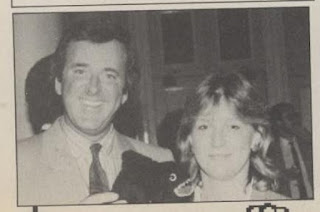 |
COMPUTER GAMER
October 1986 |
Popeye author Don Priestley wrote Trap Door. I'd love to know the circumstances that led Macmillan to also pick up the rights to Popeye. It would have been a two-way negotiation with dk'tronics and King Features Syndicate, the US copyright and trademark owner. It's odd Macmillan didn't also pick up Benny Hill's Madcap Chase, Don Priestley's follow up to Popeye and, as far as I can tell, dk'tronics' last game. Admittedly it's not a good game. Don Priestly didn't want to talk about it to CRASH and answered the question: "Do you think it fails
as a game or as a TV spin-off?" with "yes." Also, by 1986 Benny Hill was starting to be seen as tired and sleazy and perhaps not suitable material for a distinguished publishing house. The other thing odd about Popeye is it's clearly released as a Macmillan game and not Piranha. Granted the company wouldn't want to release an old game as their first title but why not hold on to it until Autumn and make that initial batch of five games into six?
The reaction to all five launch titles was positive. Although Terry Pratchett would disagree. Seven years later he told PC GAMER (
October 1993 page 20): "The Colour Of Magic came out just at the tail end of that
period, when publishers thought all you had to do was have software
and it would sell. They had the marketing skills of a wire
coat-hanger."
Trap Door got the most attention because of its big, colourful graphics. Piranha's next game was the cumbersomely titled
The Astonishing Adventures of Mr Weems and the She Vampires. This history of this game is odd. The April 1987 issue of
SINCLAIR USER claims the game was originally called
The Astonishing Adventures of Mr Weems and the Sex Vampires and was due to be released by a company called Wild Fire. The high concept idea was to advertise the game for £5 in classified adverts. The purchaser would then receive the game plus a utility to make copies, and they could make and sell copies of their own provided they sent a certain amount of money back to Wild Fire. True? False? Miscommunication? April Fools joke? A Google search for the term "sex vampires" is entertaining but not informative.
Flunky, The Big Sleaze, Through the Trap Door, and
Yogi Bear followed across 1987 with more licences on the horizon. Piranha had acquired the rights to three more IPC comic characters to follow
Rogue Trooper; Roy of the Rovers, and more excitingly
Halo Jones and
Judge Death. And then, nothing happened. All three games slipped to Easter 1988. Then Piranha's closure was announced. CRASH carried the news stating: "current turnover was not considered sufficient to justify further investment." I admired CRASH's irreverent attitude but I had a bit of a sense of humour failure when it came to the modified picture of the dead Piranha logo which seemed a little unnecessary and gloating, to me.
Alternative Software snapped up the rights to Piranha's games and rereleased them at budget prices. They sexed up
The Astonishing Adventures of Mr Weems and the She Vampires by shortening the title to the more exploitative
She Vampires. Gremlin Graphics released
Roy of the Rovers to terrible reviews in late 1988.
Halo Jones and
Judge Death vanished into limbo with
Halo Jones author
Mike Lewis delivering the Amstrad and Spectrum master tapes on the day Piranha were wound up by Macmillan.
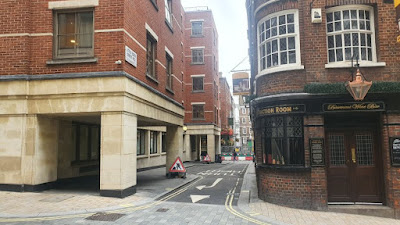 |
October 2022
|
Little Essex Street is very little. In fact it's basically an alley. A narrow strip of road separating the Cheshire Cheese pub from the modern office block opposite. Macmillan moved out of Little Essex Street in 1990 and the building must have been demolished soon afterwards. The new building is occupied by Brick Court Chambers.
Harold Macmillan -chairman of Macmillan Publishers, surprisingly enough- had already featured in CRASH (
March 1985 page 40). The monthly quiz in issue 14 asked readers to caption a photo of Lord Stockton and Clive Sinclair taken, to my best guess, at the launch of the Sinclair Macmillan range. The results were published in
issue 17. The three winners were Lewis Cohen. Saxon
Road, PE7 1NP with "I know it's easy your Lordship, but you're playing the loading screen"; Chris Beck of Grattan Street S61 JJR; "No Sir Harold, a Microdrive is not a narrow path leading up to your
front door"; and Derek Buckle of Epsom Drive IP1 6SS; "It's got more usable memory than the whole of the
Commons your Lordship." My PRIVATE EYE style satirical masterpiece is printed below and that boom you just heard was the sound of the MacMillan government collapsing.
Do you have any satirical jabs to aim at Harold Macmillan? Possibly something about his nickname Supermac or the Skybolt crisis. Do you have any more information about sex vampires? Do you have any more information about The Astonishing Adventures of Mr Weems and the Sex Vampires
. Leave a comment or email whereweretheynow@gmail.com

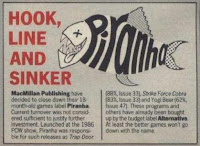

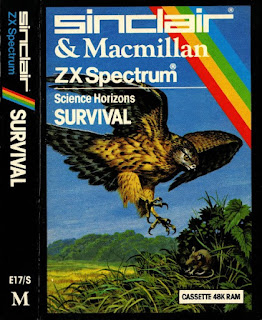
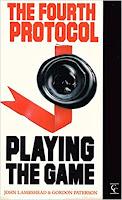










No comments:
Post a Comment